
Loyola’s Campus
Loyola's Sustainable Campuses
Our Jesuit tradition compels us to seek social justice and care for creation. We believe in local action that creates global impact. Social enterprises, such as our Biodiesel program or ChainLinks, create learning opportunities while improving the environment and local communities in sound financial structures. Our location in Northeastern Illinois on the shores of Lake Michigan allows us to understand, through research and coursework, the value of our natural resources and the impact that unsustainable development has caused. Our urban setting in Chicago connects us to local communities, providing opportunities for energy efficient buildings, sustainable transportation options and local engagement.
Lake Shore Campus
Check out a virtual tour of Loyola's Lake Shore Campus by clicking here.
Transportation
We provide efficient, convenient, and safe transportation options for students, staff, and visitors.

Loyola 'L' Station
Trains and buses connect to the city

Charging Stations
Electric vehicle-charging stations available

Car Sharing
Pick-up and drop-off location

Chainlinks
Student-run bicycle rental and repair shop

Campus Shuttle
Connects the two lakeside campuses

CTA Bus Stops

Divvy Stations
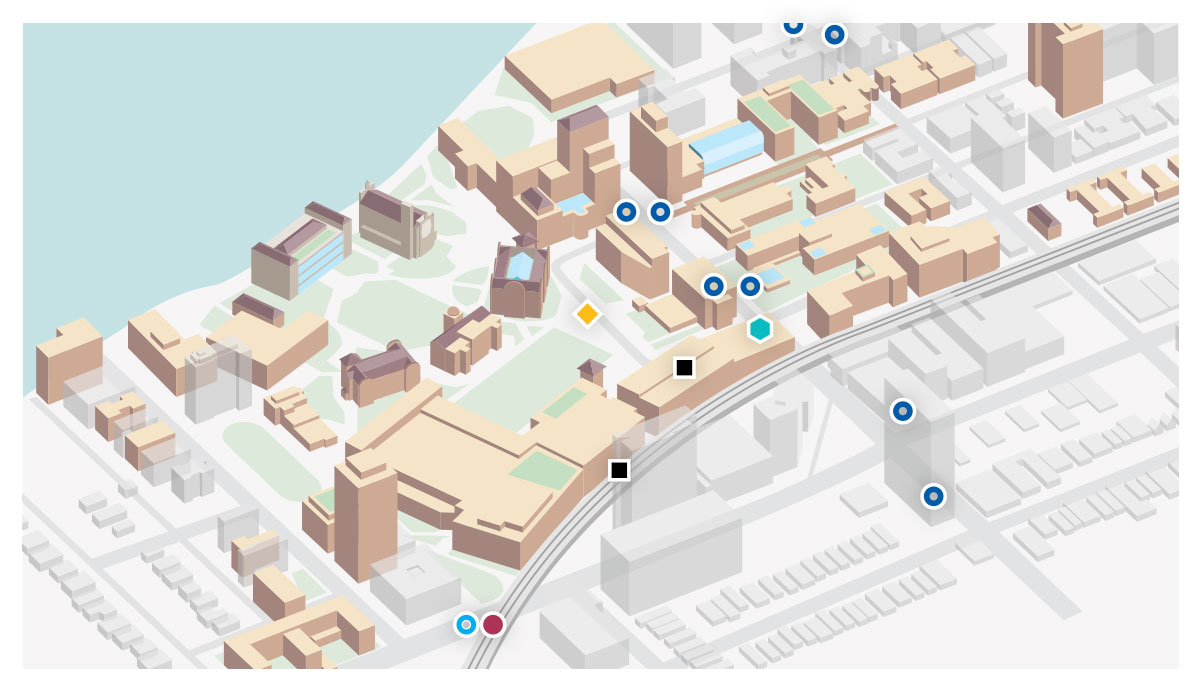
Energy
Through massive conservation efforts, off-campus renewable energy projects, and smart buildings, we are working toward being a net-zero energy campus.

Energy Efficient Buildings
Includes classrooms, residence halls, and labs on campus

LEED Certified Buildings
10 LEED certified buildings on the Lake Shore Campus

Hyper-efficient Chiller Plant and Boiler
Conserves more hot water on campus

Campus Shuttle
Shuttle runs on student-produced biodiesel fuel and connects two campuses

Electric Charging
Electric cars can be charged on campus

Geothermal
Ground source heat pump provides cooling and heating
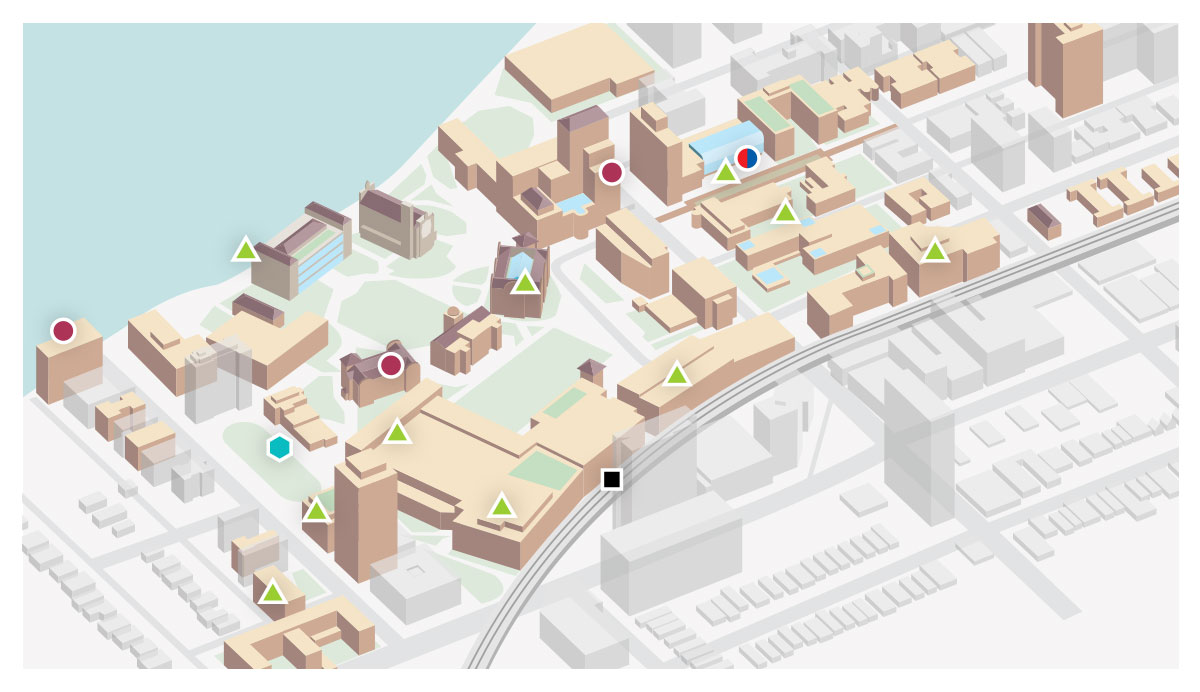
Food
Students, faculty, and staff are working to advance sustainable and healthy food for all on a local, national, and global scale.

Winthrop Garden
Demonstration garden maintained by Loyola students

SES Greenhouse & Aquaponics
The Ecodome, our 3,100 square-foot greenhouse, is home to two aquaponics systems

Farmers Market
Weekly market where students sell food grown on campus

Sustainable Loyola Dining
Sustainable options at all dining halls and select cafes

Vegewater Community Garden
Communities creating neighborhood gardens
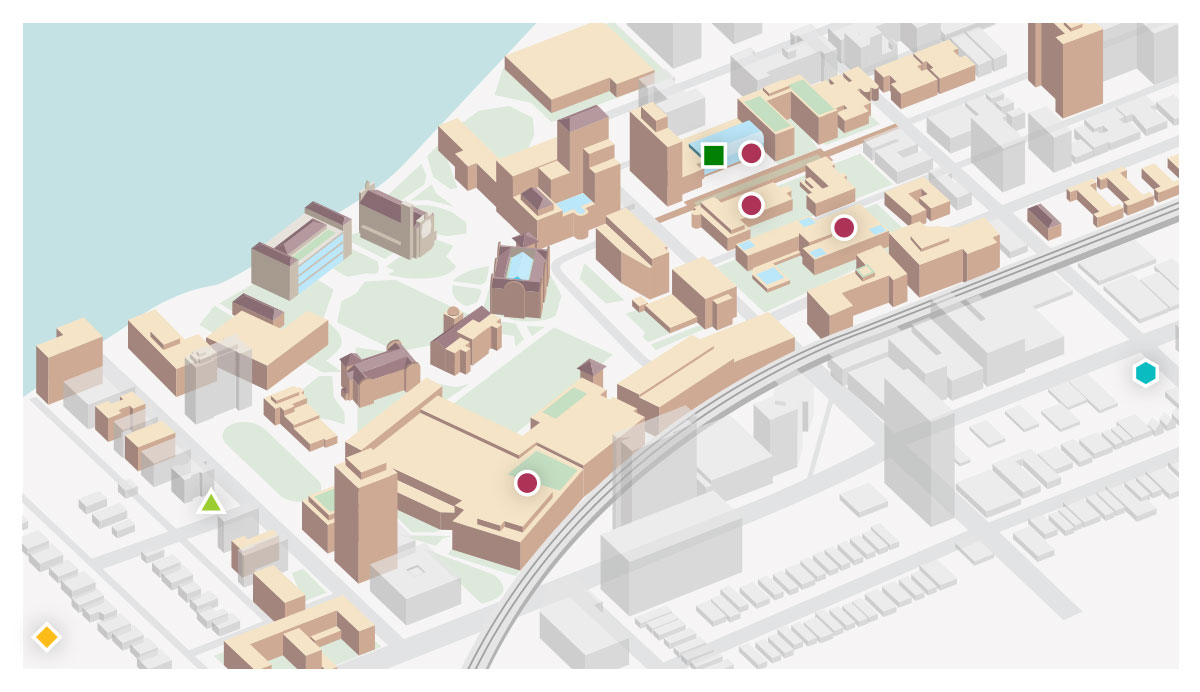
Waste
We're rethinking how materials enter and leave our campuses, and Loyola is learning how to turn trash into a resource.

Winthrop Garden
Composting initiative run by students

SES
Home of the recycling and composting campus initiatives

Compost and Recycling
Waste from Simpson and de Nobili dining halls processed

Cycle and Recycle Center
Facility to collect hard to recycle items
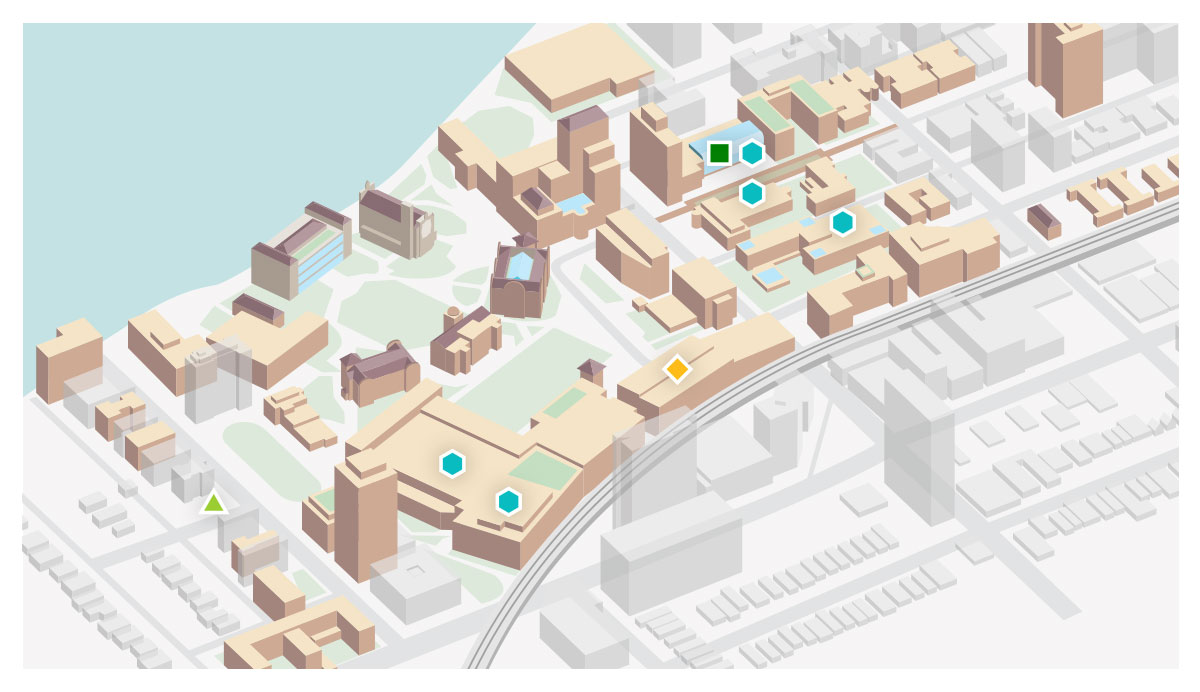
Water
As the leading university in Chicago on aquatic research, we continue to fight for fair access to drinking water and conservation.

Permeable Pavement
Collects rainwater where it falls and runs out of the sewer system

Permeable Artificial Turf
Collects runoff water for use on campus

Stormwater Retention Cistern
Filters collected water

Lake Michigan
Lake recharged from filtered storm water
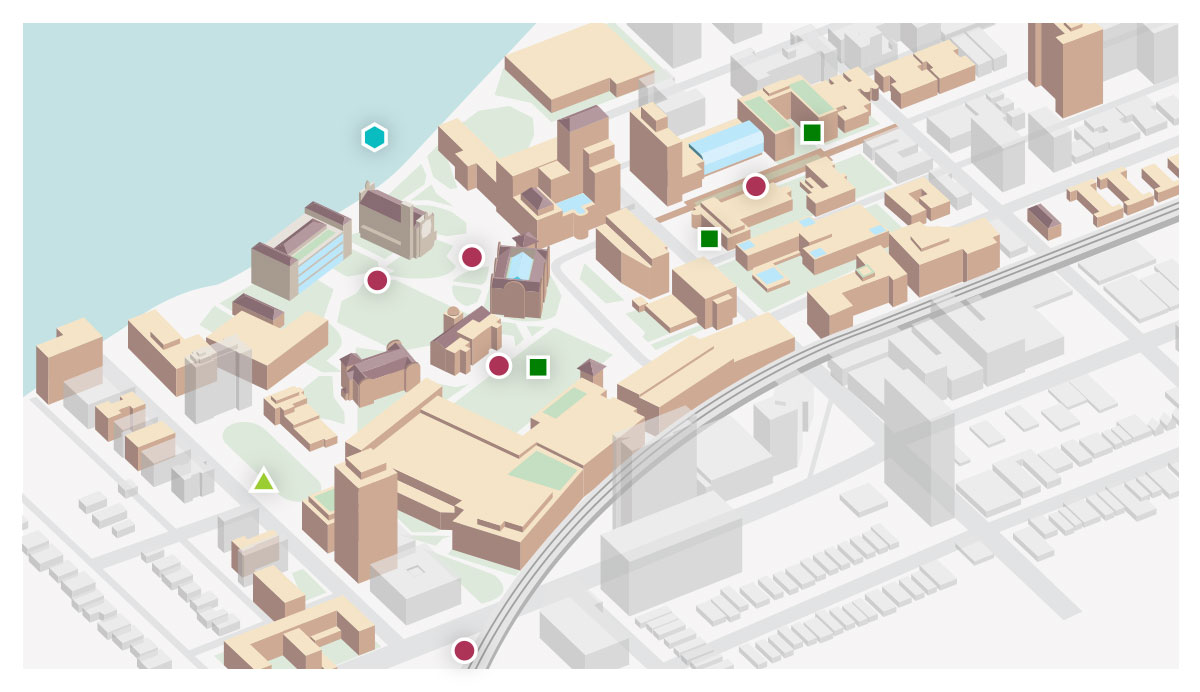
Biodiversity
Loyola’s campus landscapes are award-winning spots that connect to Chicago and to the larger ecological region.

Lake Michigan
Loyola is committed to preserving the valuable resource

Green Roofs
Loyola has more green roofs than any other university or college in the Midwest

Migratory Bird Friendly
Loyola works to prevent migratory bird collisions with campus buildings

Native Vegetation
Loyola cultivates plants that have been in our region for centuries
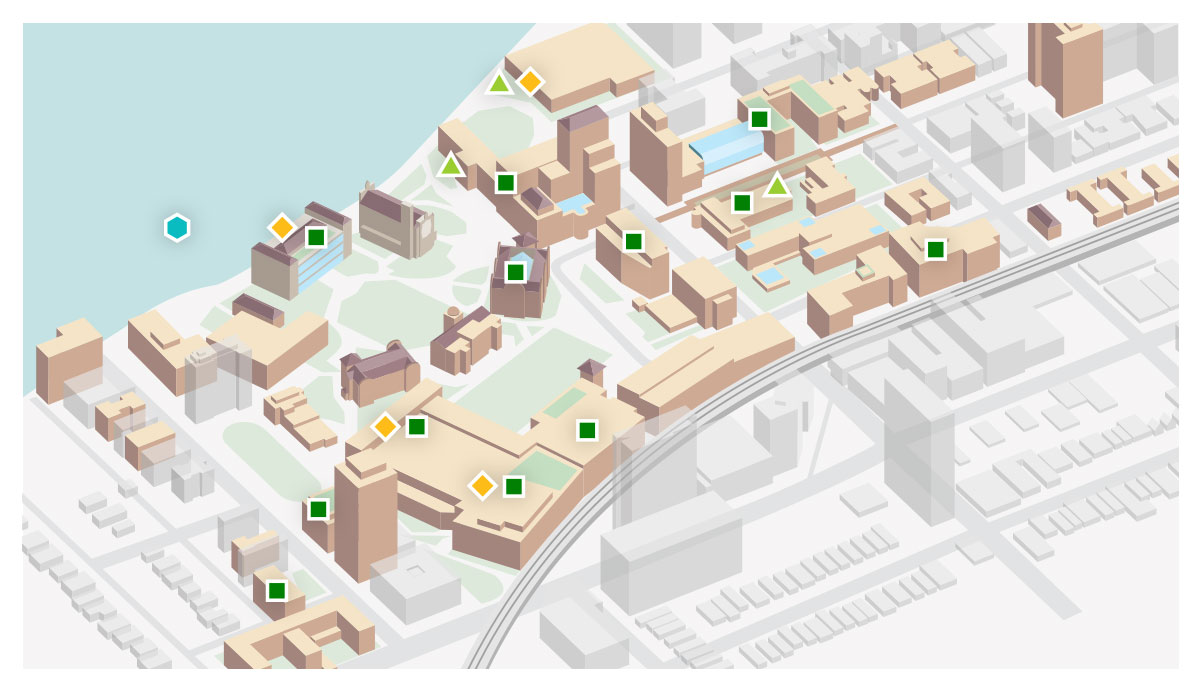
Water Tower Campus
Loyola’s Michigan Avenue campus is home to Arrupe College, the Quinlan School of Business, the Law School and other academic programs. Conveniently located among transit and commerce, five of the buildings have green roofs; Maguire, Corboy, The Clare (School of Communications), Baumhart Hall, and the Schreiber Center. The Schreiber Center is LEED Gold certified and demonstrates leading-edge energy management and natural ventilation. Baumhart Hall is Energy Star certified and home to the Terry Student Center, the Fitness studio, and one of three downtown dining venues. Composting is available in the Arrupe Dining Hall and Arrupe students may access the food pantry as needed.
Health Sciences Campus
Set within the Loyola University Hospital campus, Loyola University Chicago’s Stritch Medical School, Niehoff Nursing School, and Parkinson School of Public Health are located in Maywood, IL. Providing access to high-level research facilities and clinical experiences, Marcella Niehoff Nursing School and the Center for Translational Research and Education are LEED Gold certified.
Retreat and Ecology Campus
A special experience for all those that visit for a retreat, a class, or a just a day visit, “LUREC” is a nearly 100 acre facility in Woodstock, Illinois, 90 minutes from downtown Chicago. Used for respite and research, meetings and meditation, this campus offers classes, weekend programs and daily meeting use. Features include a remnant oak/hickory woodland, high-quality fen, and organic farm.
John Felice Rome Center
For over 60 years, students have been studying at the Rome Center in one of Europe’s most impressive capital cities. Exploring sustainability in another culture can be exciting and courses and trips to nearby areas explore these issues. The newest residence hall and chapel building was constructed with the latest low-carbon building methods and photovoltaic panels produce clean energy and solar thermal panels produce hot water.
Campus Sustainability Highlights
We've got green thumbs, buildings, buses, residence halls, and a lot of other green initiatives. Everywhere you look, Loyola's using the latest technology to protect our planet. The water you drink, the energy you use, even the stuff you throw away—it's all evidence of our commitment to sustainability.
Higher Performing Buildings and LEED
Our Commitment to Green Buildings
Loyola is committed to integrating sustainability throughout the curriculum, culture, and campus in the built and intellectual infrastructure of the university and our buildings offer a unique opportunity to facilitate learning in healthy, efficient, and safe surroundings. Learn more about Loyola's Climate Leadership
Loyola has committed all new construction & renovations, where possible, to at least a Silver rating through the US Green Building Council’s Leadership in Energy and Environmental Design (LEED) standard.
- LEED Silver: Damen Student Center, De Nobili Residence Hall, Halas Addition, Information Commons, Norville Athletic Center, St. Joseph’s Residence Hall
- LEED Gold: Alfie Center, Center for Translational Research and Education, Cuneo Hall, Francis Hall, Marcella Neihoff School of Nursing, School of Environmental Sustainability/San Francisco Hall, Schreiber Center
Many of these buildings utilize specific strategies to optimize energy use, occupant experience, and sustainable operations. You can follow the links below to learn more about Loyola’s high-performing buildings and infrastructure:
Lake Shore Campus
Alfie Center (2019) - Athletics practice facility with an eye-catching green roof USGBC Scorecard
Cuneo Hall (2012) - One of the most energy efficient classroom buildings in the country
Damen Student Center (2014) - The heart of campus featuring an innovative “earth duct” pre-tempering ventilation
Francis Hall (2021) - USGBC Scorecard
Information Commons (2008) - USGBC Scorecard
School of Environmental Sustainability (2013) - Home to the School of Environmental Sustainability and San Francisco Hall including the largest geothermal system at a school in Chicago. Learn more here
Mundelein Center (1930) - Iconic and historically significant building updated with heat-recovery and efficient systems
Health Sciences Campus
Center for Translational Research and Education (2016) - Nation-leading center for sustainable medical research including innovative space use and native gardens USGBC Scorecard
Niehoff School of Nursing (2014) - High-performing building houses the health sciences library as well as the nursing school USGBC Scorecard
Water Tower Campus
Baumhart Center (2006) - Residence hall that is home to over 400 students as well as the Terry Student Center is certified EnergyStar for its energy efficiency
Schreiber Center (2016) - Home to the Quinlan School of Business, the central atrium serves as a passive ventilation system for fresh air and interior daylighting. Learn more, USGBC Scorecard
Green Rooftops
Aerial view of the Alfie Center green roof
Loyola has more green roofs than any other college in the midwest. They can be found on the following buildings:
Lake Shore Campus:
Alfie Center, Cuneo Hall, Damen Student Center, de Nobili Hall, Francis Hall, Halas Addition, Information Commons, Institute of Environmental Sustainability, Mundelein Center, Norville Center, Quinlan Life Sciences Building, St. Joseph’s Hall, San Francisco Hall
Water Tower Campus:
Baumhart Hall, Corboy Annex, Maguire Hall (Arrupe College), Schreiber Center
Net Zero Energy Campus
Loyola Retreat and Ecology Campus
The Retreat and Ecology Campus located in McHenry County, Illinois is poised to harness clean-energy technology and dramatically reduce its carbon footprint with the goal of running the entire campus on renewable energy.
Working to implement clean-energy plans and achieve a net-zero energy status through energy efficiency and renewable energy, the University is setting out to accomplish three important goals for the campus :
- Energy efficiency retrofits for the north and south wings of the existing building, including mechanical equipment, insulation, and new windows. These efficency projects will reduce current energy consumption by 60 percent and are scheduled to be completed for 2025.
- Geothermal energy system to heat and cool the building through the use of 64 wells that are each 450 feet deep. Installation of additional geothermal wells is underway and scheduled to be completed in 2023/2024.
- Combining renewable energy systems would provide the additional 40 percent of energy needed by the building and would make LUREC the only carbon-neutral campus of its kind in the Chicago metro area.
This ambitious plan is already in progress. Simple, obvious improvements have been implemented such as enhanced insulation, replacement of single-paned windows and of inefficient HVAC systems. We are currently in the process of planning the renewable installations, which will cover all energy needs for the campus. For more information you can visit the Loyola Retreat and Ecology Campus webpage.
Storm Water Management
At the Lake Shore Campus, Loyola has prioritized water conservation and stormwater diversion from the sewer system and local neighborhoods.
Loyola has installed permeable pavers, drought-tolerant landscaping, rainwater collection cisterns, and over 50,000 square feet of green rooftops that all seek to reduce and divert stormwater run-off that otherwise would enter sewer systems, requiring energy-intensive cleaning and purification processes. Instead, our rainwater cisterns connect to Lake Michigan and feed back millions of gallons of water annually to the Great Lakes watershed.
Semi-permeable paving material is used on campus walkways and plazas and semi-permeable artificial turf is used on Sean Earl Field inside the track, allowing rainwater to percolate and filter into the ground, eventually returning to the lake.
Learn more about how these stormwater management systems work at Loyola's Lake Shore Campus here.
Loyola has also been at work to manage stormwater at the Health Sciences Campus in Maywood with our hospital partners (Loyola Medicine/Trinity Health). Improvements to stormwater management, landscaping, and other infrastructure help mitigate flooding from nearby Salt Creek and the Des Plaines River watershed.
Learn more about the stormwater management system at Loyola's Health Sciences Campus here.
Energy Efficient Design and Renewables
Clean Electricity
While Loyola has been procuring clean energy through renewable energy credits (RECs) since 2008, 100% of electricity has been provided through national wind RECs starting in January 1, 2023. Loyola has committed to purchase 100% of their electricity from a large central Illinois solar development starting January 1, 2025.
Geothermal systems
Two campuses are served by geothermal. The largest system in Chicagoland supports the 217,000 square foot Institute of Environmental Sustainability. This innovative system is paired with water to water heat pumps and the well field is installed underneath the building. It is paired with a dual-fuel boiler to provide extreme cold weather back up. The Loyola University Retreat and Ecology Campus (LUREC) has a large geothermal system of 64 wells, 450 feet deep.
Heating and Chilled Water Plant
Loyola’s upgraded chilled water plant cools approximately 1,500,000 square feet of the Lake Shore Campus. It was one of the first Variable Primary Systems, saving more than $1 million in underground piping alone. By decentralizing our boiler plant to conserve hot water on campus, nearly $1 million is saved by the University annually.
Loyola has transitioned from steam to hot water systems and is systematically adopting low-temperature hot water systems building by building as part of the decarbonization strategy.
Mundelein Center Energy Retrofit
This 15-story skyscraper, built in 1928, is listed on the National Registry of Historic Places and is a mixed-use facility for classrooms, offices, an auditorium, theater, and greenhouse. Its heating, cooling, and ventilation systems were retrofitted to become more energy-efficient, including smaller ductwork. An Enthalpy Wheel for heat recovery, demand-controlled ventilation, displacement ventilation, and radiant heating and cooling.
Cuneo Hall
Sustainable features in this LEED Gold building resulted in a 77 percent reduction in annual energy use. The 72,000 square foot facility features high-performance Envelop, semi-manual natural ventilation, Enthalpy wheel energy recovery, dual-temperature radiant ceiling panels for classrooms, and a state-of-the-art building automation system.
Corboy Law Center Boiler and Chiller Retrofit
The boiler and chiller retrofit to this 15-story, 285,000 square foot building saves the University 10,387 MBtu annually. This retrofit project included three high-efficiency condensing boilers, two electric water-cooled chillers, and new controls.
Loyola University Medical Campus - Maywood, IL
Our medical campus is a shared venture between the University and Trinity Medical Services. Over 690,000 square feet of buildings include the Stritch Medical School, Niehoff School of Nursing, Parkinson School of Health Sciences and Public Health. Sustainability highlights include the LEED-certified Niehoff School of Nursing’s use of daylight harvesting, natural ventilation, solar chimneys, and automated sun shading.
Composting
Loyola’s organics diversion program (including in dining halls, the Compost Bucket Program, Zero Waste Games, and more) allows for faculty, staff, and students, to divert as much as 20% of all waste at Lake Shore and Water Tower Campuses. Learn more about how composting works.
All organic waste from the three Lake Shore Campus dining halls and the Arrupe College dining program at the Water Tower Campus are composted as well in addition to the many Zero Waste programs available to Loyola students and employees.
Water Conservation and Smart Irrigation
With Loyola’s proximity to Lake Michigan and our academic strength in aquatic ecology, Ramblers conserve water to protect this globally significant resource.
Audits have been completed for water fixtures on all campuses and retrofits of shower-heads, faucets, and other equipment have been installed.
Our #WaterBounty program encourages the reporting of water leaks through our Work Order system to help Facilities address issues as soon as possible.
On-campus implementation of water-smart landscaping required drought-tolerant vegetation and technology. Loyola uses a zoned irrigation system that relies on weather station data to conserve water. New spray heads reduced water use by 30% and the “smart irrigation system” ensures watering when evaporation rates are lowest.
Green Data Centers
Recognizing the impact computing equipment can have on energy consumption, Loyola has invested in highly efficient data centers across its campus. In particular, our Information Technology Services team virtualized over 70 percent of its servers, upgrading to Energy Star equipment, and has its own Green Team to continue the culture of sustainability.
Sustainable Dining
Dining at Loyola University Chicago is managed by two partners: Aramark (Lake Shore and Water Tower Campuses) and HandCut Foods (Health Sciences Campus). Both of Loyola's dining vendors incorporate sustainability through initiatives like diverting pre- and post-consumer food waste from landfills and sourcing ingredients that are plant-based, local, and/or third-party certified.
One example of a sustainable dining option on the Lake Shore Campus is Engrained Café. Engrained is a fast-casual, quick serve restaurant designed to be an educational food experience surrounding sustainability, which was recently certified as a 4-star Green Restaurant through the Green Restaurant Association. Engrained Café features both vegan and vegetarian options. There is also a focus on healthier eating based on seasonal fresh fruits and vegetables and local foods when available. In addition to a sustainable menu, the modern environment features sustainable furniture from local Chicago wood manufacturers. Engrained Café is located inside San Francisco Hall.
Sustainable Catering is also available through the "Sustainable" and "Sustainable & Low-Carbon" options when ordering through Loyola Dining. These options will reduce waste, source sustainable items, and engage your guests in sustainable event management at Loyola.
Ecological Restoration
Native landscaping and naturalized gardens can be found at Lake Shore and Health Sciences Campuses. These help lessen local environmental impact and support biodiversity for both endemic and migrating species.
Ecological courses, internships, and Restoration Work Days take place at the Loyola University Retreat and Ecology Campus (LUREC). Visit our LUREC site for additional information.
Green Groundskeeping
Facilities Management oversees the maintenance of campus grounds such as landscaping and snow removal.
Landscaping is conducted with sustainable strategies in mind including organic fertilizers and an Integrated Pest Management (IPM) approach to insects and disease. Fertilizer use is limited to highly ornamental beds and seasonal plantings.
Recognizing the importance of protecting the watershed and Lake Michigan, Facilities Management applies sugar beet-based anti-icing granules along with appropriate salting to reduce slip and fall risk. The sugar beet-based application is applied to campus roads and sidewalks before and during snowy, icy weather to effectively melt snow and ice for safe conditions. This is better for landscape vegetation as stormwater runoff is less salty.
Campus trees are cared for by specialized arborists and Loyola prides itself on its urban forest providing cooling shade, important habitat, and a relaxing landscape for all to enjoy.
Green Cleaning
Facilities Management Department uses non-hazardous and low VOC cleaners, such as Green Seal, for cleaning campus buildings. The use of Green Seal, an independent organization that adheres to strict standards for safe environmental performance, adds to the Loyola commitment of minimal use of resources and reducing impact to the natural environment.
- Green Seal cleaning products used on campus reduce exposure to harsh chemicals
- Protects water quality by reducing use of harsh chemicals
Water Tower Campus
Loyola’s Michigan Avenue campus is home to Arrupe College, the Quinlan School of Business, the Law School and other academic programs. Conveniently located among transit and commerce, five of the buildings have green roofs; Maguire, Corboy, The Clare (School of Communications), Baumhart Hall, and the Schreiber Center. The Schreiber Center is LEED Gold certified and demonstrates leading-edge energy management and natural ventilation. Baumhart Hall is Energy Star certified and home to the Terry Student Center, the Fitness studio, and one of three downtown dining venues. Composting is available in the Arrupe Dining Hall and Arrupe students may access the food pantry as needed.
Health Sciences Campus
Set within the Loyola University Hospital campus, Loyola University Chicago’s Stritch Medical School, Niehoff Nursing School, and Parkinson School of Public Health are located in Maywood, IL. Providing access to high-level research facilities and clinical experiences, Marcella Niehoff Nursing School and the Center for Translational Research and Education are LEED Gold certified.
Retreat and Ecology Campus
A special experience for all those that visit for a retreat, a class, or a just a day visit, “LUREC” is a nearly 100 acre facility in Woodstock, Illinois, 90 minutes from downtown Chicago. Used for respite and research, meetings and meditation, this campus offers classes, weekend programs and daily meeting use. Features include a remnant oak/hickory woodland, high-quality fen, and organic farm.
John Felice Rome Center
For over 60 years, students have been studying at the Rome Center in one of Europe’s most impressive capital cities. Exploring sustainability in another culture can be exciting and courses and trips to nearby areas explore these issues. The newest residence hall and chapel building was constructed with the latest low-carbon building methods and photovoltaic panels produce clean energy and solar thermal panels produce hot water.
Campus Sustainability Highlights
We've got green thumbs, buildings, buses, residence halls, and a lot of other green initiatives. Everywhere you look, Loyola's using the latest technology to protect our planet. The water you drink, the energy you use, even the stuff you throw away—it's all evidence of our commitment to sustainability.

